The Climate Solutions Fund, supported in part by the generous proceeds from a Dead & Co. concert at Cornell, seeks to accelerate impact-oriented efforts in The 2030 Project pillars: food & farms of the future; energy systems of the future; materials of the future; and societies of the future – helping to develop systems that support human flourishing while minimizing harmful climate impacts.
2024 Climate Solutions Fund Awards
Scaling a Solution to Climate Change, Health, Agriculture, Water, and Energy Challenges in Africa
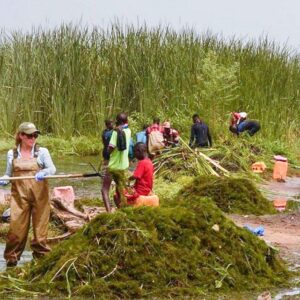
Schistosomiasis, a disease caused by blood flukes that live in freshwater snails, afflicts over 200 million people globally, with over 85% of cases occurring in Africa. Snails live in aquatic vegetation and humans become infected when they enter infested water bodies to gather water for drinking, agriculture, or other purposes. Climate change is exacerbating the problem by changing rainfall patterns and increasing pest and disease pressures. Cornell researchers and their colleagues discovered that removing invasive aquatic vegetation significantly reduces Schistosomiasis in children and increases open water access without harming water quality or freshwater biodiversity. Further, the removed vegetation can be turned into compost and livestock feed – creating business opportunities for local entrepreneurs and providing local, sustainable sources for agricultural inputs. The researchers seek to scale and sustain their innovation with a network of partners in Senegal.
Investigators: Chris Barrett, Dyson School; Ying Sun, School of Integrative Plant Science
Using Artificial Intelligence for Reducing Food Waste in Commercial Kitchens
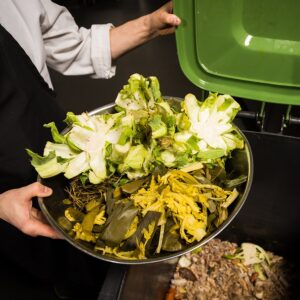
Worldwide, one-third of all food produced for human consumption goes to waste. In the hospitality and food-service industry alone, the cost of wasted food is over $100 billion per year. This project will explore using AI tools to reduce food waste in commercial food service establishments, a goal that would benefit food security, environmental resources, and private businesses’ bottom lines. Along with colleagues at Cornell Tech and industry partner Winnow, the researchers will first examine the effectiveness of a computer vision-based system that accurately measures and classifies food waste. Early results suggest that deployment of such a system can reduce food waste by as much as 30%, three months after adoption. Then they’ll build and test AI assistants to help kitchen managers with front-line tasks that can reduce food waste, such as managing inventory, providing directions on how and when to produce foods, and detecting mistakes in food production decisions.
Investigator: Elena Belavina, Operations, Technology, and Information Management
Cornell Advanced Platform for Testing, Utilization, and Research in CO2 Capture and Conversion Technologies
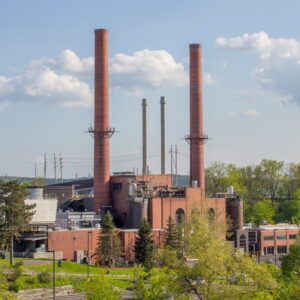
This project proposes to establish the Cornell Advanced Platform for Testing, Utilization, and REsearch in CO2 capture and conversion technologies (CAPTURE-Lab), an experimental carbon capture and utilization or sequestration and industrial decarbonization facility at Cornell’s existing Combined Heat and Power plant. The researchers plan to establish a mobile lab adjacent to the plant that will analyze gas emissions and provide real-time information about its composition. They would then examine and test materials for carbon capture, sequestration and conversion, industrial decarbonization, and pollution controls using flue gas emissions from this working power plant. This type of actual flue gas is difficult for researchers to access, in both industry and academia. The project will support interdisciplinary research on both basic science and lab-to-market feasibility.
Investigators: Tobias Hanrath, Chemical and Biomolecular Engineering; Phil Milner, Chemical and Biomolecular Engineering; Greeshma Gadikota, Civil and Environmental Engineering
Multi-Hazard Resilience for Climate Justice
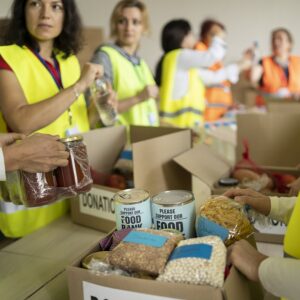
Resilience hubs are community-based facilities that are co-developed and co-designed with community partners to meet residents’ needs, for short-term emergencies like heat waves or power outages, and for long-term needs, like community organizing or food security. Resilience hubs are intended to enhance communications and community resources, reduce pollution, bring forward impacted community partners as decision-makers, and improve quality of life. Cornell researchers will collaborate with existing organizations in a diverse range of communities across New York and with state agencies to operationalize resilience hubs. The researchers seek to pilot resilience hubs, develop collaborative knowledge, and build a successful and replicable model for other New York communities interested in creating their own resilience hubs.
Investigators: Rebecca Morgenstern Brenner, Brooks School; Alistair Hayden, Public & Ecosystem Health
Biological Remediation of Methane Emissions From Abandoned Oil and Gas Wells
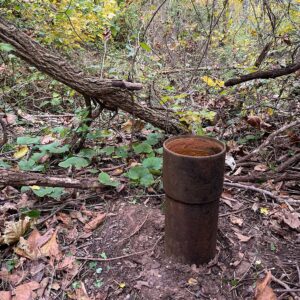
There are an estimated 3.5 million abandoned oil and gas wells in the United States, and fugitive emissions of methane from these wells are estimated to be equivalent to releasing 7.1 million metric tons of carbon dioxide per year. The traditional method to plug wells is to enclose them in cement, but this process is expensive: roughly $40,000 per well. This project aims to address methane emissions more affordably, by covering wells with biologically based filters. Such biofilters convert methane into carbon dioxide. Though CO2 is also a potent greenhouse gas, methane has significantly more harmful short-term impact – converting methane to CO2 decreases its 100-year global warming impact by more than 95%. The researchers will build and test their biofilters in the lab, then evaluate their real-world performance on abandoned oil and gas wells in Allegany State Park in Western New York State.
Investigators: Matthew Reid, Civil and Environmental Engineering; Ruth Richardson, Civil and Environmental Engineering; Jason Oliver, Animal Science and PRO-DAIRY

